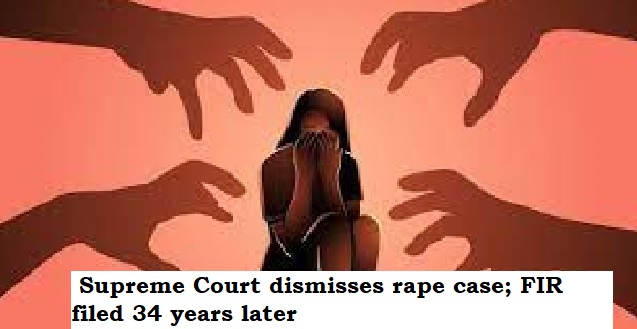


The Supreme Court recently rendered a significant judgment, bringing attention to the complexities and challenges surrounding a rape case where criminal proceedings were quashed. The accused, facing charges of raping a minor, found reprieve as the court carefully considered the circumstances underpinning the case. Central to the court's decision was the realization that the First Information Report (FIR) had been lodged a staggering 34 years after the alleged incident, further compounded by the fact that the accusation relied solely on a bald statement asserting that the prosecutrix was a minor at the time of the offense.
The judiciary, in its wisdom, highlighted the unprecedented delay in filing the case. A lapse of 34 years raised serious questions about the reliability of the evidence, the memories of the parties involved, and the overall integrity of the judicial process. Such a prolonged gap presented inherent challenges in ascertaining the truth and ensuring a fair trial for all parties.
The core issue at hand was not only the delayed filing of the FIR but also the foundation upon which the case rested. The accusation was anchored on a bald statement asserting the minority status of the prosecutrix at the time of the alleged offense. The court, in its nuanced analysis, scrutinized the veracity of such a claim, emphasizing the need for concrete evidence and a robust legal foundation to sustain grave allegations like rape.
The judicial pronouncement underscored the principle that justice must be dispensed with a delicate balance between the rights of the accuser and the accused. While acknowledging the heinous nature of the crime, the court sought to ensure that legal proceedings are conducted with due diligence and adherence to established legal norms. In this instance, the court expressed reservations about the reliability of a case built primarily on the claim of the prosecutrix's age, especially considering the prolonged delay in bringing the matter to the court's attention.
The judgment brought to the fore the challenges of adjudicating cases where the passage of time significantly hampers the collection of evidence and the memory of the parties involved. The court recognized the difficulties in reconstructing events that transpired more than three decades ago and the potential for miscarriage of justice if critical details were lost or distorted over time.
Additionally, the court's decision hinted at the need for a robust legal framework that addresses the timeliness of filing criminal cases. While recognizing the gravity of offenses like rape, the court cautioned against the pitfalls of delayed justice, urging lawmakers to consider measures that strike a balance between protecting the rights of victims and ensuring a fair trial for the accused.
In conclusion, the Supreme Court's quashing of the rape case, filed 34 years after the alleged incident, serves as a poignant reminder of the intricacies involved in administering justice, especially when confronted with prolonged delays and reliance on scant evidence. The judgment highlights the imperative of upholding legal principles and maintaining a delicate equilibrium between the interests of the accuser and the accused in the pursuit of justice.
TAGS: Supreme Court Criminal proceedings Rape case Quashed FIR